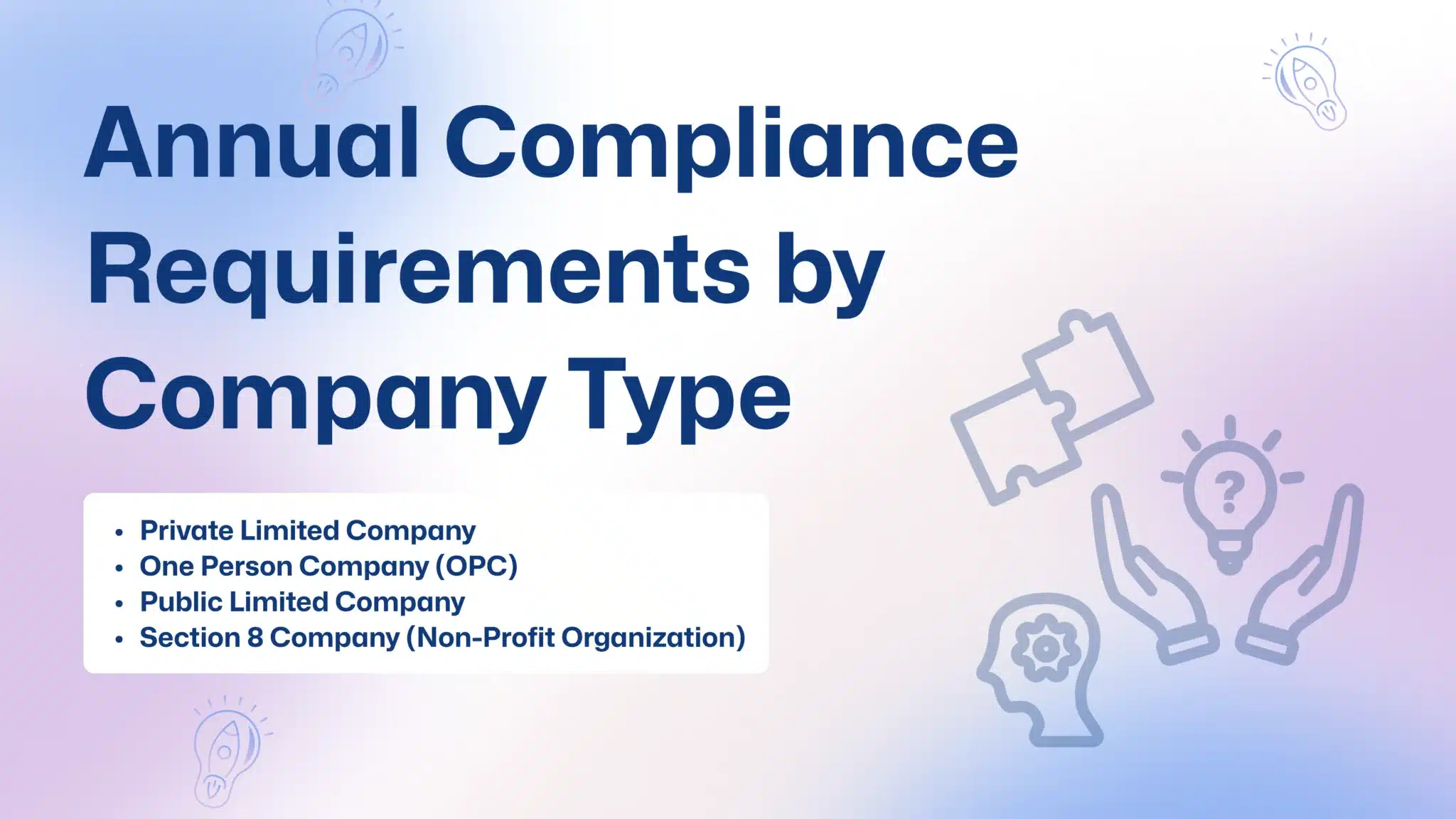Annual compliance in India refers to the set of compulsory filings and regulations that every company must fulfill each year to remain legally active. These compliances are regulated under the Companies Act, 2013 and are overseen by the Ministry of Corporate Affairs (MCA). Whether it is a Private Limited Company, One Person Company (OPC), Public Limited, or a Section 8 Company, every registered business must complete its annual compliance obligations.
Compliance is more than just a statutory requirement—it strengthens credibility, builds investor confidence, and protects businesses from penalties or disqualification. Even companies with no turnover or business activity must comply, as skipping annual filings may result in the company being struck off from ROC records.
In this blog, we’ll explore annual compliance requirements, their applicability, benefits, key filings, penalties, and a simple compliance checklist to help you keep your company on track in 2025.
Annual Compliance Requirements by Company Type
Annual compliance applies to almost all forms of registered companies in India:

- Private Limited Company: Every Private Limited Company must file annual returns and financial statements with the ROC. T]his applies even if the company has no sales or profit.Small companies can use the simplified return Form MGT-7A.
- One Person Company (OPC): An OPC gets some relaxations. It does not need to hold an Annual General Meeting (AGM). Still, it has to file its annual return, financial statement, and Director KYC every year to remain active.
- Public Limited Company: A Public Limited Company has stricter rules. It must hold AGMs on time, share details of directors and shareholders, and submit complete annual filings. These compliances help keep investor trust.
- Section 8 Company (Non-Profit Organization): A Section 8 Company works for charitable or non-profit purposes. Enjoys certain relaxations, but must file annual returns and financials with the ROC to retain its non-profit status.
Advantages of Annual Compliance
Meeting annual compliance offers several advantages beyond avoiding penalties:
- Legal Recognition & Trust – Filing returns on time establishes your company as law-abiding and transparent.
- Investor & Lender Confidence – Compliance records are reviewed by banks and investors before offering loans or funding.
- Avoids Penalties – Late or missed filings attract heavy daily fines and legal consequences.
- Smooth Business Operations – With all filings up to date, government departments, regulators, and partners view your business as reliable.
Thus, annual compliance is not just a formality but a foundation for credibility and long-term growth.
Registrar-Related Annual Compliance (ROC Filings)
The most critical part of annual compliance involves filings with the Registrar of Companies (ROC).
Annual General Meeting (AGM)
- First AGM: Must be held within 9 months of the end of the first financial year.
- Subsequent AGMs: To be held within 6 months of the financial year end, but not later than September 30.
- Exemption: One Person Company (OPC) and Section 8 Companies are exempt from holding AGMs.
Auditor Appointment (Form ADT-1)
- A company is required to appoint its first statutory auditor within 30 days from the date of Incorporation.
- Form ADT-1 is filed to inform ROC about the appointment.
- The auditor is usually appointed for 5 years, subject to ratification at AGMs.
Filing of Financial Statements (Form AOC-4)
- Audited financial statements, along with Board Report, must be filed within 30 days of AGM.
- Details include balance sheet, profit & loss account, and (Wherever Applicable) cash flow statements.
Annual Return (Form MGT-7 / MGT-7A)
- To be Filed within 60 days of AGM (Annual General Meeting).
- Contains shareholding structure, changes in directors, and other key company details.
- MGT-7A is a simplified version for small companies and OPCs.
Director KYC (DIR-3 KYC)
This is mandatory for all the directors annually by 30th September.
Failure to file DIR -3 KYC can result in deactivation of Director Identification Number (DIN) and late fees.
Income Tax Return (ITR-6)
- Every company, whether active or dormant, must file ITR by 31st October (unless extended).
- Filing is mandatory even with nil income.
All these necessary filings collectively form the backbone of ROC-related compliance.
Other Non-ROC Compliances
Apart from the ROC filings, companies must also meet financial and taxation-related compliances:
- GST Returns – GST Returns are filed monthly or annually depending on turnover and scheme opted.
- TDS Returns – TDS Returns are the quarterly returns for deductions made on salaries, vendor payments, or certain sales.
- Advance Tax Payments – Paid in four instalments (June 15, September 15, December 15, March 15).
- Labour Law Compliances – Contributions to Provident Fund (PF), Employee State Insurance (ESIC), Professional Tax, and Shops & Establishments registration where applicable.
- Sector-specific Regulations – Companies in finance, insurance, or other regulated sectors must also meet RBI, SEBI, or IRDAI compliances.
Non-compliance of obligations may invite interest, penalties, or cancellation of licenses.
First-Year vs. Subsequent Year Compliance
The first year of compliance is slightly different from subsequent years:
- First Year:
AGM to be conducted within 9 months of the financial year-end.
Auditor appointment within 30 days of incorporation.
- Subsequent Years:
AGM within 6 months of year-end (not later than September).
Annual filings such as AOC-4 and MGT-7// MGT 7A follow statutory deadlines.
Auditor tenure continues unless re-appointment is due.
This distinction is crucial for new incorporated companies, especially Private Limited Companies and OPCs.
Statutory Registers and Records to Maintain
Every company must maintain statutory registers as part of its compliance:
- Register of Members – Details of shareholders and their shareholding.
- Register of Directors & KMP – Information on directors and key officers.
- Register of Charges – Records of secured loans, mortgages, or assets pledged as security.
- Minutes of Meetings – Proper minutes of board and general meetings.
These registers must be updated regularly and kept at the registered office in compliance with the Companies Act 2013 for inspection by authorities.
Penalties and Consequences of Non-Compliance
The consequences of non-compliance can be severe:
- Monetary Penalties – For example, late filing of Form AOC-4 or MGT-7 attracts ₹100 per day until filed.
- Disqualification of Directors – If annual returns are not filed for 3 continuous years,directors can be disqualified under Section 164 of the Companies Act.
- Strike-Off of Company – The ROC has the power to remove the company from its records.
- Reputation Loss – Non-compliance damages trust with investors, lenders, and customers.
Key Compliance Calendar (2025)
Here is the simplified month- wise compliance calendar for Indian companies:
| Compliance Activity | Due Date / Frequency | Applicable Forms |
| AGM | First year: within 9 months; thereafter 6 months from FY end | – |
| Filing Financial Statements | Within 30 days of AGM | AOC-4 |
| Annual Return | Within 60 days of AGM | MGT-7 / MGT-7A |
| Auditor Appointment | Within 30 days of incorporation | ADT-1 |
| Director KYC | 30th September every year | DIR-3 KYC |
| Income Tax Return | 30th Sep (unless extended) | ITR-6 |
| GST Returns | Monthly/Quarterly/Annually | GSTR-1, GSTR-3B, GSTR |
| TDS/TCS Returns | Quarterly | Form 24Q/26Q |
Conclusion
Annual compliance is the key factor of corporate governance in India, which protects the company as well as build trust with stakeholders. Whether you operate a Private Limited Company, One Person Company (OPC), or a Section 8 Company, adhering to the compliance calendar is essential.
Keeping statutory records, submitting returns on schedule, and getting expert advice helps businesses secure their future. Follow deadlines, stay organized, and ensure your company meets all compliance requirements in 2025. To explore more insights, visit our blog, Finguru India, for regular updates on compliance and business law.



